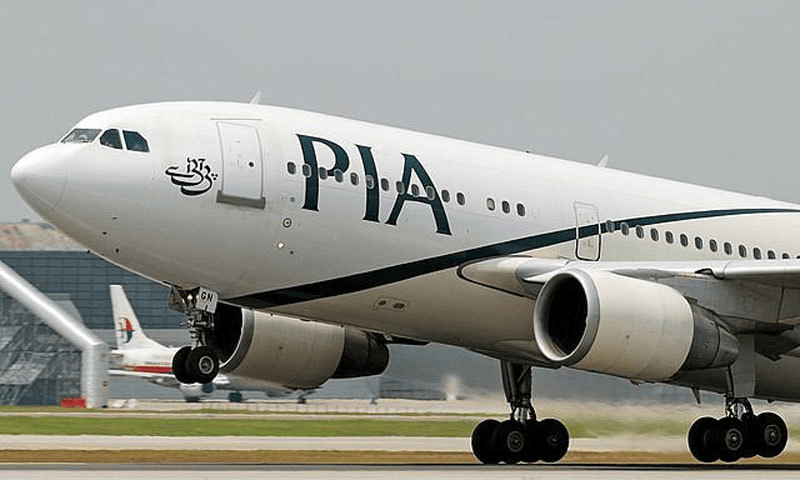- Web
- Feb 05, 2026
Government seeks IMF approval for Rs26 billion tax exemption to boost PIA privatization
-

- Web Desk Karachi
- Nov 19, 2024

ISLAMABAD: The government has requested approval from the International Monetary Fund (IMF) for a tax exemption worth Rs26 billion to enhance the appeal of Pakistan International Airlines (PIA) to potential investors.
This initiative emerges as PIA’s privatisation efforts encounter further obstacles, with tax relief being a significant demand from prospective buyers. During a parliamentary briefing Privatization Minister Abdul Aleem Khan indicated that the success of the sale hinges on crucial tax exemptions and financial modifications to render PIA an attractive investment opportunity.
During the discussion took place at a Senate Standing Committee on Privatisation meeting, led by Senator Talal Chaudhry, it was revealed that one of the key requests from investors is an exemption from the advance general sales tax (GST) on the addition of new aircraft to the airline’s fleet. Such a move is anticipated to lower operational expenses and bolster PIA’s financial stability.
Additionally, the government is tasked with addressing PIA’s negative equity, currently at Rs45 billion. This will involve restructuring legacy liabilities to provide a clean financial background for prospective investors prior to finalizing the sale.
The endorsement of the tax relief and liability restructuring plan by the IMF is critical, as its approval impacts Pakistan’s broader economic strategy within the context of its Extended Fund Facility (EFF) programme.
The financially struggling national carrier, burdened with Rs45 billion in negative equity, poses challenges in attracting potential buyers. Investors have stipulated three non-negotiable conditions: a Rs26 billion tax waiver, the elimination of Rs10 billion in bridge financing costs, and the transfer of PIA-owned property in Islamabad valued at Rs12 billion.
“We communicated these demands to the government, but the Federal Board of Revenue (FBR) and finance ministry have stalled our efforts, leaving the privatization process in limbo. They have not supported us,” stated the minister.
Aleem Khan remarked, “As a businessman, I see significant potential. The government simply needs to be decisive in the sale process. We must clean up its balance sheet to attract both local and international investors.”
Moreover, he said that if someone from another country or an investor purchased PIA, they would not take responsibility for our previous mistakes. The concerns have been communicated to the government but some elements are beyond influence.
Defending his involvement in the process, stating he joined it mid-way, comparing it with global privatization cases. “Even India went through five attempts to privatize Air India. This is a complex undertaking,” he noted.
The minister criticized Ernst & Young (EY), the consulting firm overseeing PIA’s privatization, for its inadequate performance. “We require an advisor with experience in the airline industry for future endeavors,” he asserted. “In the future, we will hire a different consultant. While EY is a credible firm, they did not meet our expectations.”
When questioned about payments to EY, Privatization Commission Secretary Usman Akhtar Bajwa confirmed to the panel that EY had received 45% of the consultancy fee. The value of the contract with EY amounts to Rs1.95 billion (approximately US$6.96 million).
In response to the committee chairman’s inquiry about any innovative solutions like government-to-government (G2G) or government-to-business (G2B) options, the minister noted that the prime minister has engaged with various international leaders during his visits, discussing potential approaches. Talks are currently ongoing at higher levels to facilitate a G2G arrangement.
The minister added, “We will restart the process, and if the numbers indicate positive equity, new investors will be attracted.”
The Privatization Commission secretary mentioned that the ministry and the FBR had indicated that they could not advance the process without IMF approval. He stated, “The FBR cannot proceed without the IMF’s endorsement.”
Bajwa elaborated, “The prime minister has directed us to prioritize this matter and consult with the IMF, as this deal hinges on its approval. We held a meeting with the Fund on Nov 15 and presented our critical requirements, which include the GST waiver and addressing negative equity. The Fund assured us of a prompt response. Without these conditions, we cannot proceed with the privatization.”
He revealed that negotiations with entities like Abu Dhabi Ports were ongoing, expressing optimism about PIA’s potential. “PIA operates on several profitable routes, making it an appealing proposition,” he noted.




